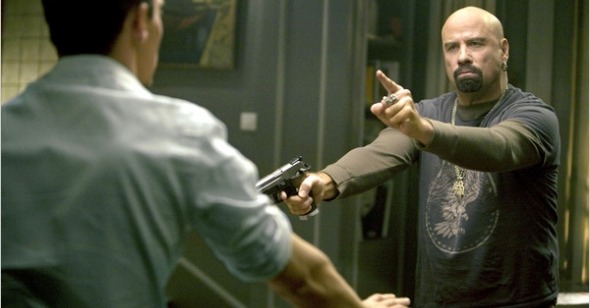Gun Play
By Justin Stewart
From Paris with Love
Dir. Pierre Morel, U.S./France, Lions Gate
With their unflagging commitment to kinetic thrills, director Pierre Morel's three collaborations with Luc Besson—occasional director, now more storyboarding idea man—earn the duo consideration as the action genre's current reigning champions. That does require that you forgive District B13, Taken, and the new one, From Paris with Love, their frequent jaw-dropping ludicrousness and consistent reliance on white male heroes forgivably murdering ethnic evildoers. Those willing to sync up with Morel/Besson will see that there is in fact nothing dumb about these movies in either conception or execution and that they’re driven by sharp wit and self-awareness. One need only compare Taken, that wild riff on a kidnapped daughter's father's revenge, with this year's Hollywood model—the morose, soggy Edge of Darkness—to see how much more rousing the output of Besson's EuropaCorp can be.
Following Taken, this second version of A Heavily Armed American in Paris exchanges the revenge architecture for cop buddy digs, though it never settles into them in a predictable way. Jonathan Rhys Meyers is James Reece, a hotshot aide to the U.S. Ambassador in Paris. When we meet him he's pacing and talking on a cell, and with a distracted eye on a chessboard, destroying the ambassador at the game (instant brilliance cred). Turns out he's also a CIA operative, and the voice on the phone has told him to “secure a chip” in the office of some French diplomat. He is able to gum and staple the recording device to the bottom of the diplomat's desk, but these kind of piffling assignments are boring the restless Reece, who has two cool jobs and a sexy French girlfriend (Kasia Smutniak), but craves mostly top-level CIA activity. It arrives in the form of a new partner, Charlie Wax, his name as nattily hyperreal as the film itself. Wax, played by a startlingly bald and beefy John Travolta, is arguing with a customs agent who refuses to let Wax keep his duffel bag full of Rattlesnake energy drink cans. It's pretty obvious that the cans are full of weapons (various parts of Wax's favorite gun, it turns out).
They go to a mediocre Chinese restaurant, and are discussing the proper Mandarin word for "egg" when Wax calls for clarification from the waiter, who can't help. In the movie's first burst of dime-drop violence, Wax suddenly opens fire, which is returned before most of the staff—who are in fact drug lords—are wasted. When Wax fires some shots into the ceiling, cocaine starts pouring down (it apparently occupies the entire floor above). Reece catches some in a large vase, which he proceeds to comically tote around Paris. He and Wax even cavalierly sample the product while atop the Eiffel Tower. This begins Reece's brisk education in the workings of Paris's underbelly (or at least Morel and Besson's conception of such), a terrifying place full of murderous pimps, radical Islamic suicide bombers, betraying loved ones, and unstable Blackwater-looking dudes like Wax running around shooting up the whole place with Uzis and bazookas. The world of From Paris with Love is not politically pleasant, and some of its prejudices smack of the worst of Bush-era simplifications, but it is valid. Though less cartoonish, the real-life counterparts to the movie's crime gangs and radicals exist, and it would be the mission of a Charlie Wax or John Reece to destroy them. The operatives are morally dubious, too, especially when Wax prevents Reece from saving some local cops, after which Reece spies his guilty, blood-spattered image in a mirror.
From Paris with Love over-bludgeons at times, numbing you to the sight of bullets mowing down criminals. It's the same excess that makes that other EuropaCorp product, the Transporter movies, a bit wearisome. But there's a grace to the action akin to John Woo's Hong Kong movies. The fleet direction is key, lacking both the overly edited stylization of Guy Ritchie or the jitter-cam incoherence of Paul Greengrass's Bourne films. Also crucial is the fact that Travolta, old dog though he may be, can still move (for further proof, check out the video he made with his daughter for a cover of "Every Little Step"). His body has steadily bloated over the years, but in even proportions—he's more stocky than beergut-fat. Under a thick leather jacket and heavily scarved, Travolta is ambiguously large and intimidating, a mass of man without definition. It works. "His methods are a bit unorthodox, but Wax always gets the job done," someone generically notes. Yet the character fits believably in the movie's comic book-like Paris. Making him so outsized, Travolta and the filmmakers acknowledge the inherent parody that is Wax. There's even a wink at Travolta buffs: his favorite food is a Royale with cheese.
Because it operates from the honest desire to manufacture thrills, the film is forgivable even when it leaps credibility. Improbably, pouty pretty boy Reece is from the Cypress Hills Projects in East New York, possibly arrived at when screenwriter Adi Hasak googled “dangerous New York neighborhood.” At one point, Wax signals a satellite (with immediate results) by pressing a button on his watch.
The movie shifts from the infiltration of an Asian drug cartel to a tracking of suicide-bombing fundamentalists. It might seem jarring or opportunist, but the focus on the more urgent peril is fluid and necessary—for a movie about CIA operations in today's Paris to not acknowledge this most serious threat to big-city civilization would seem like an oversight. Grievances with From Paris with Love's macho bluster and political riskiness probably won't stop it from recreating the success of Taken, also released on the typically quiet Super Bowl movie weekend. With technical skill and a sense of humor, these Frenchmen have done their part raising the bar of the modern gun movie.
